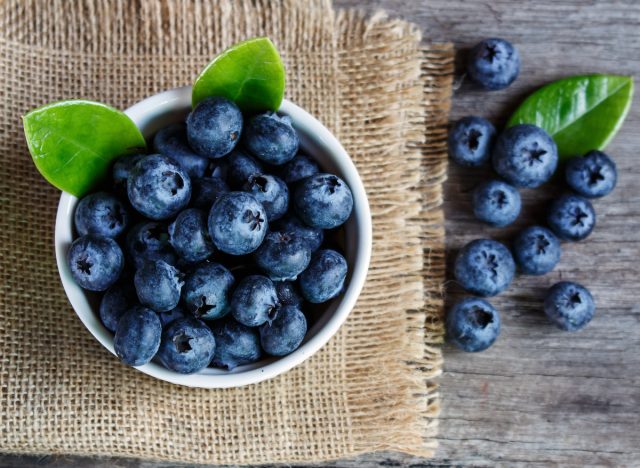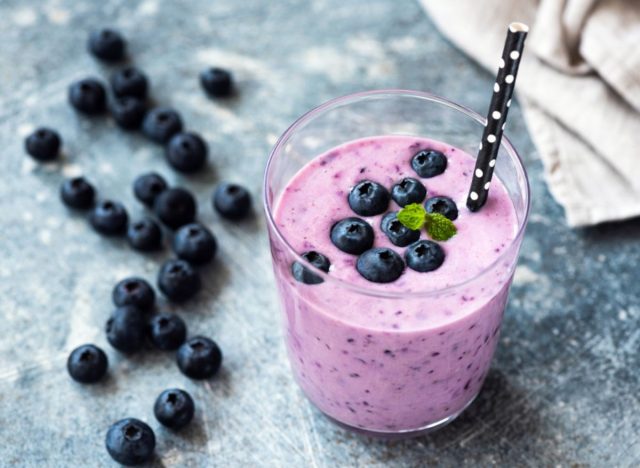With their gorgeous blue hue and satisfyingly sweet taste, blueberries are one fruit many people can agree is a welcomed addition to their meals, snacks, and fruity cocktails or mocktails. The benefits of blueberries are plenty: Between the natural fiber these beautiful blubs contain, the sweet taste they provide with no added sugar, and the boost of antioxidants they naturally house, as a clinician, I would be hard-pressed to find any major downside to including these berries in most diets—especially if they are added to a balanced and healthy diet, and they are consumed in an appropriate serving size.
The benefits of blueberries prove that this fruit is more than just a tasty superfood; it may be the perfect fruit that supports your health goals. In fact, some experts suggest that eating blueberries may quite literally keep the doctor away. Perhaps this is because one serving (a handful or a cup) of blueberries contains less than 100 calories while also contributing essential vitamins and nutrients that your body needs to support your cardiovascular health, insulin response, and cognitive health, among other benefits.
If that isn't enough to encourage you to consider incorporating more blueberries into your diet, read on to learn more about the science-backed benefits of eating blueberries.
A look at the nutrition info of blueberries

Ahead of jumping into how this tiny blue fruit's myriad of benefits can potentially impact your overall health and wellness, let's get into how the nutrition info breaks down for blueberries. According to the USDA, one cup of raw, juicy blueberries nourishes your body with:
- 85.5 calories
- 1.11 grams protein
- 0.5 grams fat
- 21.7 grams carbs
- 3.6 grams fiber
- 14.9 grams sugar
- 14.6 milligrams of vitamin C (16% DV)
- 29 micrograms of vitamin K (24% DV)
- 116 milligrams of potassium (2% DV)
- 0.42 milligrams of iron (2% DV)
There are a variety of blueberries to choose from, including highbush and wild lowbush. And while there are slight differences among the different types, including the size, flavor, and antioxidant content, you can rest assured that when you eat any type of blueberry, you will consume many important nutrients that are beneficial to your body, including dietary fiber, iron, vitamin K, vitamin C, and phytonutrients called polyphenols.
7 Health Benefits of Blueberries

Here are some ways eating blueberries may benefit your body and health, backed by science.
1. Blueberries are rich in antioxidants.
In addition to containing essential vitamins and minerals, blueberries are also enriched with phytonutrients called polyphenols. This group of polyphenols includes anthocyanins, which are compounds that give blueberries their beautiful blue color. This compound not only gives blueberries their distinguished natural blue pigment but also anthocyanins act as an antioxidant.
Wild blueberries have 33% more anthocyanins than ordinary blueberries, but all blueberries do contain a significant boost of this natural compound. Anthocyanins have been linked to having anti-diabetic, anti-inflammatory, and anti-cancer effects. It has also been linked to a reduced risk of cardiovascular disease development.
2. Blueberries may improve cardiovascular health & even help you avoid heart disease.
If cardiovascular disease isn't on your radar, it should be. According to the CDC, cardiovascular disease is the leading cause of death in the U.S. While many factors can play into our risk of developing cardiovascular disease, our dietary choices may play into one piece of the puzzle. Quitting smoking, exercising, and maintaining a healthy weight are all excellent steps to keep your ticker ticking. Additionally, diet plays a key role in keeping your heart healthy, and data indicates that blueberries not only help support healthy heart function but also can act as a deterrent against heart disease, as well.
One 2019 study published in the American Journal of Clinical Nutrition found that those with metabolic syndrome—a cluster of symptoms that includes obesity, elevated fasting glucose, and decreased HDL cholesterol—who consumed the equivalent of one cup of fresh blueberries daily showed improved changes in measures of heart health, like increased HDL cholesterol (the "good" cholesterol) levels. It also revealed that eating around a cup of blueberries daily reduced the risk of cardiovascular diseases (CVDs) by up to 15% among the study's population. In another study published in Food & Function, researchers noted that foods that are rich in anthocyanins were associated with a reduction in the risk of cardiovascular disease.
3. They help support brain health.
Blueberries and your brain health are a match made in heaven, and those beautiful blue antioxidants may be the ticket to keeping your mind sharp and healthy. A 2018 study published by Nutritional Neuroscience revealed that older adults with cognitive impairment had increased brain activity in certain parts of the brain while on a blueberry-supplemented diet. Furthermore, a randomized clinical trial published in 2022 showed that consuming wild blueberries every day for six months improved cognitive aging by improving the speed of information processing in older adults.
No matter what your age is, studies have also shown that anthocyanins—the colorant in blueberries containing antioxidant properties—may help to improve cognitive function. Researchers suggest that anthocyanins may decrease inflammation, improve blood flow, and increase communication between cells in the brain, possibly explaining why these berries are so impactful on brain health. For children, data shows that those between the ages of seven and 10 performed cognitive tasks better after consuming a wild blueberry drink than when they did not. A positive effect on working memory has been seen among older adults who consume anthocyanins, as well. One study evaluated the effects of blueberry intake on human brain function by having participants follow a diet supplemented with blueberries daily for 90 days. Researchers found that people showed significantly fewer errors in tests used to assess verbal memory and task switching compared to those who took a placebo.
While research is still needed to definitively say that a cup of blueberries truly keeps the doctor away, incorporating those sweet little fruits into your diet comes with little (if any) risk. Small steps, like sprinkling them onto your oatmeal, adding them to your smoothie, or even dipping them in yogurt and freezing them for a refreshing snack, will certainly not cause harm to your health, and they may actually help!
4. They can aid in glucose management.
One of the benefits of blueberries is improved post-meal glucose management, potentially because of the fruit's effects on the digestive system. Plus, a study looking at three different groups of anthocyanins found that blueberries may help to induce insulin secretion, which is a common problem for people with type 2 diabetes.
5. Blueberries may modulate your insulin response.

Insulin resistance is a condition in which cells do not fully respond to the action of insulin, a hormone that regulates blood glucose—according to the American Diabetes Association. As a result, the cell's ability to take in sugar (glucose) is impaired, and blood glucose levels become abnormally high. Insulin resistance can lead to type 2 or adult-onset diabetes, the most common form of diabetes. Many people try and limit their sugar intake when they are managing their insulin response. Unfortunately, some people, in turn, avoid fruit. While limiting refined sugar is a good idea if you manage your blood sugars, cutting out fruit like blueberries may cause more harm than good in the long run. Don't let the natural sugars in fruit scare you—some fruit, like blueberries, can possibly help your glycemic control!
A study published in Current Developments in Nutrition found that the equivalent of one cup of fresh blueberries daily may beneficially affect areas of health in subjects diagnosed with type 2 diabetes. In the study, when participants ate one cup of blueberries daily, they experienced significantly lower levels of serum triglycerides compared to placebo. Left untreated or uncontrolled, elevated blood triglyceride levels may increase the risk of serious complications such as cardiovascular disease—the leading cause of morbidity and mortality for individuals with diabetes.
In another study, people were told to drink smoothies either with or without blueberries twice daily for six weeks. The researchers found that those who consumed the blueberry-containing smoothie were better able to lower their blood glucose in response to insulin than those who consumed the smoothie without blueberries.
6. They may help lower blood pressure.
Reducing sodium intake may be the darling of the blood pressure-reducing steps, but eating blueberries deserves some attention in this department too. In an eight-week study, people with a high risk of heart disease and who had obesity experienced a 4–6% reduction in blood pressure after consuming freeze-dried blueberries every day for eight weeks.
7. Pregnant women may have a reduced risk of developing gestational diabetes.
Developing gestational diabetes can occur for various reasons, some being completely out of a person's control. But some data suggests that dietary choices may impact some people's risk of developing this condition.
Specifically, data suggests that pregnant women who ate 280 grams of blueberries every day, along with 12 grams of supplemental soluble fiber, resulted in a reduced risk of developing gestational diabetes. Additionally, maternal weight gain was significantly less among those who ate the blueberries and fiber supplement versus those who did not.
No comments:
Post a Comment